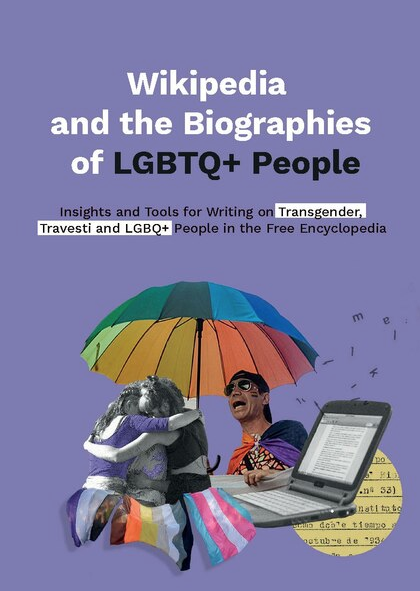
In 2022, Wikimedia Argentina released the important guide “Wikipedia y las biografías de las personas LGBTT+”: una guía de reflexiones y herramientas de Wikimedia Argentina. The guide, written in Spanish and localized to Argentina, includes reflections and tools on Wikipedia and how to present biographies of LGBTT+ people. The guide invites reflection on the writing of biographies of trans, non-binary and other members of the LGBTQIA+ community and what it means to write about their lives on Wikipedia, from a human rights perspective.
Following its release, a new collaboration was created to work on an English translation of the guide to help broaden its reach. The English translation was generated in cooperation with Vic Sfriso of Wikimedia Argentina, Owen Blacker of Wikimedia LGBT+ User Group, and Sofia Stancioff and Kira Wisniewski of Art+Feminism. The team were excited to launch this translation at Queering Wikipedia in May 2023.
The team thought it critical to center the Latin American localization in the English version. So much of the Wikimedia movement is centered in English with a US, Canada or Western European context, but by preserving the Latin American localization in the English translation, it helps serve as a reminder of how global and nuanced the Wikimedia Movement is.
The collaborators found it especially helpful to take an organic process rather than being driven by self-imposed deadlines; the team brought in more collaborators when extra expertise was needed. While working on this project, the challenges of the term “travesti” was discussed, since it is still considered a slur in many regions in the world, including in European Spanish and other languages, but has been reclaimed in parts of Latin America. As a result, the group felt it important to not erase a word used as a term of self-identity in Latin American countries, the context in which the original guide was written.
To help address this, the team added two new essays, written by scholars in the field. The first is “On the word ‘travesti’: some considerations on the trajectory of travesti identity in Argentina and Latin America” by An Millet, an activist, social worker and trans masculine lesbian also from Argentina who wrote Cisexismo y salud. Algunas ideas desde otro lado [Cis-sexism and health, some ideas from the other side], the third book in the collection “Justicia epistémica” [Epistemic Justice] from Puntos Suspensivos, an independent LGBTIQ+ publishing house in Buenos Aires. The second essay, “Trans-related terminology in the English-speaking world: a historical guide” is from Dr Kit Heyam, a queer trans writer, academic and heritage practitioner from the United Kingdom, who recently published Before We Were Trans: A New History of Gender, currently a finalist for the 2023 Lambda Award for Transgender Nonfiction. Their essays give more nuance and context around the use of this language.
Both the original Spanish version and this translated English version of the guide were designed by Argentinian designer, Gisela Curioni. The team is excited to share this translated work with these two new essays on Wikimedia Commons with a Creative Commons license and looks forward to future translations that will also center the original Latin American context.
The guide can be found on Wikimedia Commons as Wikipedia and the Biographies of LGBTQ+ People 2023, Wikimedia Argentina, with the collaboration of Wikimedia LGBT+ and Art+Feminism.pdf

Can you help us translate this article?
In order for this article to reach as many people as possible we would like your help. Can you translate this article to get the message out?
Start translation